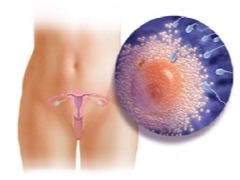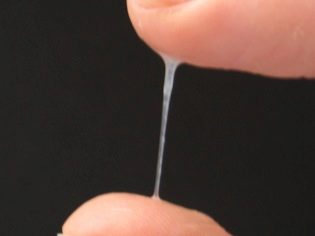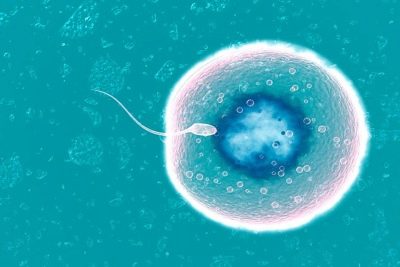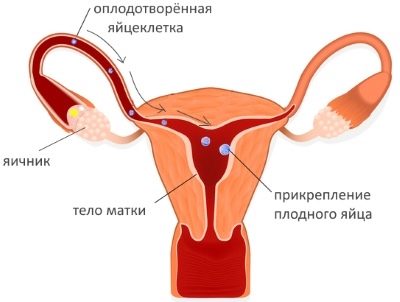What are the selection after ovulation, if the conception happened?
Women who are planning a pregnancy, with particular trepidation and bated heart listen to their feelings after ovulation. Conception took place or not - this is the main question, which for two weeks does not allow them to live in peace and do their usual activities. It is clear that there is no point in waiting for a response from a pregnancy test after a likely conception.
The first and earliest signs of pregnancy women begin to look for in a change in health, basal temperature, as well as in the nature of vaginal discharge. What they can be if the conception was successful, we will tell in this article.
Little about physiology
Shortly before ovulation, the discharge becomes more abundant, the woman may feel constant moisture in the perineum. Sexual desire increases, and this is how nature takes care of that a woman in rare periods of her fertility (and this is only a few days a month) does not miss her chance to continue the race.
The only possible day for conception is ovulation itself and the day after it, while the egg cell that has left the follicle is alive. Secretions from the genital tract during ovulation resemble egg white in their consistency - they are transparent, viscous, and can be stretched between the fingers into a thin “thread”. Such secretions are observed at the time of conception of the baby and for about another day after it. It does not matter whether the very conception took place, the selection will be just that.
During this period, the mechanisms of vaginal secretion are affected by estrogen. His task is to make the vagina immediately the least aggressive, so that male reproductive cells that have entered the genital tract have a better chance of survival, a successful transfer to the fallopian tubes, where the sacrament of the male spermatozoon and the female ovum occurs.
If conception has occurred, the nature of the discharge will begin to change literally by day. After all, the hormone progesterone will begin to exert a preferential effect on the woman's body, whose task is to prepare the endometrium of the uterus for implantation of a fertilized ovum. Progesterone is produced in the female body and if conception did not occur, its level will decrease several days before the beginning of menstruation.
Character detachable by day
If conception happened, then normal secretions on 2-3 days after ovulation will be less abundant than during fertilization of the egg, discharge. In a large number of vaginal secretions after ovulation, the female body has no need, in any case, there will be less discharge. The color of the discharge is white or yellowish, transparent or slightly beige. The watery consistency after the “decisive” intercourse with a successful conception gradually changes to a thicker one.
Disorders that have a heterogeneous structure, impurities of blood, pus, greenish and grayish discharge are considered abnormal. They can talk about the presence of infection and the possible conception will not be able to change their character. But the infection can radically change the course of pregnancy in its very first days.If there is an infection, the fertilized egg may not be fixed in the uterus or be fixed with disturbances.
That is why it is important to definitely treat existing infections at the very early stages of pregnancy planning, before making it happen.
So, in the first days after ovulation and possible conception, the secretions remain abundant, watery. On the second or third day of discharge becomes less. For some women, they can practically disappear and there will not even be a trace on the daily lining.
On the fourth day, the egg is half way to the uterus, it is also a zygote and intensively crushed. The vaginal secretion at this stage is rather scanty, creamy, it does not smell. From the fifth to the sixth day, progesterone actively acts on the uterine endometrium, which under the influence of the hormone thickens and becomes more friable. Selections these days are no different from secretions of the third or fourth day after ovulation.
At 8-9 days implantation occurs. This is a very delicate moment, it is on this day that it is decided whether to be a full-fledged pregnancy. About a third of her cases, alas, does not occur. The blastocyst (this is the name of the fertilized egg) is not always able to successfully consolidate in the wall of the uterus. It can be prevented by inflammatory or infectious diseases, increased uterine tone, scars on the walls of the main reproductive organ, and hormonal metabolic disturbances. Also, the blastocyst may not have a sufficient level of enzymes necessary for "insertion" into the uterine wall. This is characteristic of embryos with coarse chromosomal abnormalities that are virtually non-viable.
It is during the implantation period that nature itself conducts natural selection, deciding whether to be a child, whether it can develop further. Neither a woman nor a doctor can affect the probability of successful implantation. This is beyond the competence of the person.
If the question of the future fate of the embryo is resolved positively, on day 8-9 a woman can feel the first changes in the nature of the vaginal discharge. On laying it can notice bloody spotting, scanty and insignificant. This is the first and earliest sign of pregnancy, which is called "implant bleeding." Blood, blood, pinkish cream discharge - all these are variants of such bleeding.
Some blood may be released due to the violation of the integrity of small blood vessels when a blastocyst is inserted into the uterine wall. Implantation occurs at 3 weeks of pregnancy and there are no inaccuracies. Just obstetricians measure the duration of pregnancy from the first day of the last menstruation. Ovulation thus occurs in 2 weeks, and the tests will begin to show the second strip in no way before 4 full weeks (which corresponds to the first days of the start of the delay).
It should be noted that implantation bleeding may be accompanied by additional sensations - a slight increase in body temperature, a feeling of chills. Such bleeding, some women take for hormonal failure or prematurely begun menstruation. However, a day later, brown or bloody scanty discharges disappear without a trace.
Implantation of not all women is accompanied by bleeding, and therefore not every pregnant woman can observe this first sign of their “interesting” position.
After implantation, the nature of the discharge may change. Regardless of whether it was accompanied by small bleeding or not, on 10-11 days after ovulation, the discharge becomes even thicker. In some women, they acquire a pronounced yellowish-lemon hue. This is due to an increase in the concentration of progesterone, whose task at this stage is to help soften the uterine muscles, which will allow the germ to develop more organically.
Chorion at the site of attachment of the blastocyst will subsequently become the placenta. In the meantime, it begins to produce a specific hormone - human chorionic gonadotropin (hCG). The hormone will increase about two times every two days and during this period up to a delay in discharge from the genital tract can be quite scarce, slightly increasing in volume only a couple of days before the expected day of the beginning of the next menstruation.
Under the influence of hCG after ovulation, some women can already theoretically begin to feel the first symptoms of pregnancy - mild nausea in the morning, dizziness, chills and a slight increase in body temperature in the afternoon or evening, severe thirst or lack of appetite. Toxicosis as such at such an early date usually does not happen and all the described sensations are poorly expressed. Most women who are unaware of conception, because they did not plan a pregnancy, they do not even pay attention.
4-5 days before the start of the next menstruation, a woman may notice that the discharge did not just begin to curl up with "pellets", but it also appeared. Strange as it may sound, but thrush is sometimes the first sign of pregnancy. - so the female immunity expresses its “protest” against the beginning large-scale changes in the female body, because a huge number of global restructuring processes take place in it.
Menstruation during pregnancy - is it possible?
Even the onset of menstruation on time cannot be a guarantee that the pregnancy has not come. If in this cycle a woman developed not one, but two eggs with a difference of several days, then not the first, but the second cell could be fertilized, and then the first would leave the uterus with menstrual bleeding, which will be, however, more scarce and smearing than usually.
If menstruation began and proceeds abnormally, quickly ends, it is still desirable to do a pregnancy test. It is possible that the situation with two eggs this month occurred with you.
It is the lack of attention with such short and scanty menstrual periods that sometimes puts a woman in front of a fait accompli when she already has 4 or even 5 months of gestation. If there is reason to believe that pregnancy is possible, then any abnormal periods are the reason for a visit to the doctor.
Other signs before delay
Since the period after ovulation can be considered as “dry” by and large, in the complete absence of implant bleeding a woman should pay attention to changes in basal temperature. This is reasonable if she has previously kept a temperature calendar, measured it and knows her normal values. When conception took place, the temperature does not decrease after ovulation and remains quite high.
Incomprehensible and little more than understandable malaise 5-7 days after the likely conception is also one of the indirect signs of pregnancy. There are women who intuitively guess their condition and position. They cannot explain where such firm confidence in their pregnancy came from, but this confidence comes almost a day after fertilization. Such a subtle "flair" is usually characteristic of women who have previously become pregnant, nursed and gave birth. Primiparids usually do not attach any special meaning to the "special" signs of the body.
Experienced women usually attribute such “special” intuitive signs not only changes in the character of their discharge, but also astonishingly inspired mood, craving for beauty, lyrical music, poetry, kind and sentimental films and books, as well as a new perception of the surrounding world.
About 15% of all pregnant women, remembering their earliest terms, agree that the first days after conception experienced something similar, but always attached proper importance to this.
About what are the selection after ovulation, if conception has occurred, see below.




























